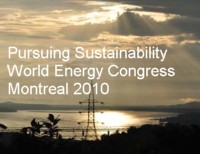Pursuing sustainability - World Energy Council's 2010 Assessment of energy and climate policies
 In order to face the challenges of
In order to face the challenges ofenergy sustainability - energy security, social equity, and
environmental impact mitigation - we will have to put in place
sustainable energy and climate policies.
This is the key conclusion of the
World Energy Council’s 2010 Assessment of Energy and Climate
Policies released in time for the World Energy Congress
held in Montreal September 12-16, 2010.
The Energy and Climate Policy
Assessment, produced in conjunction with Oliver Wyman, is World
Energy Council’s contribution to meeting the challenge of designing
new energy governance with sound and effective public policies.
For this second edition the Council
developed a unique methodology aimed to identify, in a bottom-up
approach, effective polices around the world and to examine how
they can be transferred from one country to another.
“Even as we speak, all countries are
working to develop strategies for putting the crisis behind them.
Economic growth is an entirely and worthwhile goal for all
countries, said Pierre Gadonneix, Chair of the World Energy
Council.
“And because energy goes hand in
hand with development, the question of inequalities is another
central concern. We need effective rules and smart policy
frameworks to update our energy policies and rise to these three
challenges”, he added.
The report on Energy and Climate Policies stresses
the fact that energy players need long term horizons; that there is
also a need for real prices, that effectively reflect all costs,
including CO2; and that tailoring policies to the maturity of
technologies will be key to keep the transition costs to a
minimum.
“Policymakers need to embrace the
complexity introduced by the often conflicting agendas of
developing secure, affordable and clean energy,” says John Drzik,
CEO of Oliver Wyman Group.
“To achieve this, they should
conduct a much fuller cost benefit analysis that examines measures
to improve both their energy supply and demand.”
The review of country policy
frameworks and their implementation underdone in the past 12 months
reveals a wide range of successful approaches.
In terms of fossil fuel-based energy
security policies, China, Japan, and Russia have effective, yet
different, approaches to developing resource-oriented partnerships
with other countries, based on strategic alliances, technological
expertise, and financial strength.
US technology investments have
resulted in rapid advances in opening up new domestic natural gas
resources through the hydraulic fracturing of deep shale, and the
ability to take advantage of that expertise overseas.
In terms of alternative energy
supply, several regimes stand out. Using different policy
approaches, Germany and Texas (US) have made strong progress in the
deployment of renewable energy within their transmission
infrastructure.
Brazil and Ghana have been
particularly successful in using off-grid renewable energy to
increase access to electricity for rural populations. France’s
carefully planned approach to renewing and enhancing its nuclear
capacity is a model for an established nuclear nation.
In terms of energy efficiency and
demand-side management, Japan’s programmes, directed largely at
industry, have achieved significant reductions in consumption,
while innovative schemes in Brazil have encouraged domestic
manufacturers to develop low energy consumption appliances.
Denmark provides a benchmark for
building design standards, and California (US) and Ontario (Canada)
are front-runners in the development of smart grids.
The world has reached a critical
juncture for energy policy making, says the report. Energy demand
is rising from non-OECD countries that are undergoing both rapid
population growth and economic development, while domestic fossil
fuel reserves are declining, and the remaining large-scale oil
reserves are difficult to access.
Strong
measures are needed to mitigate the impacts of climate change, it
argues. Much energy infrastructure in OECD countries needs to be
renewed, while many non-OECD countries are still seeking to extend
access to energy across their populations.
Both the recent economic downturn
and the failure to reach a binding international consensus on
reducing greenhouse gas emissions have impeded policy solutions to
these issues.
Although the global financial crisis
caused a dip in global energy consumption and a temporary
stabilisation of emissions, it also reduced the availability of
investment capital and increased uncertainty about infrastructure
project economics.
target=”_blank”>The full report can be downloaded
here
Source: www.worldenergy.org

